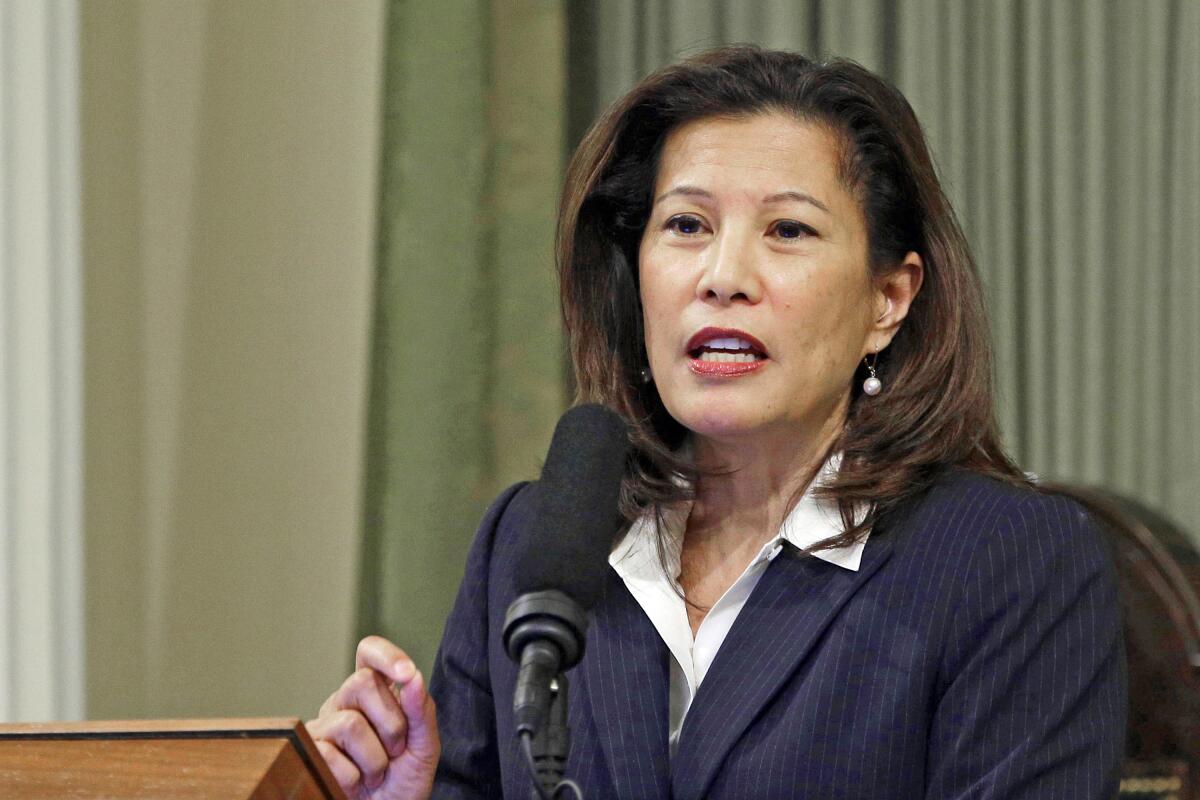Former California chief justice joins private mediation firm after criticizing industry

- Share via
Before leaving her post as California’s top judicial official in January, former Chief Justice Tani Cantil-Sakauye said she had serious concerns about the rapidly growing industry of private judges.
In response to revelations by The Times that such for-hire judges had helped facilitate the misappropriation of client funds by fallen legal titan Tom Girardi, Cantil-Sakauye said in August that the largely unregulated industry was ripe for greater oversight.
In her last open forum with journalists in November, Cantil-Sakauye reiterated those concerns, and said the increase in private mediation and arbitration — pushing litigation behind closed doors and out of the public record — also threatened the evolution of California jurisprudence.
But now, just a few months after retiring from the bench, Cantil-Sakauye is joining the private industry herself — signing on with ADR Services, which specializes in alternative dispute resolution in California. The company touts a full roster of prominent jurists and former judges available for hire for private mediation, arbitration and consulting.
In an interview with The Times on Thursday, Cantil-Sakauye — a moderate who was considered a consensus builder on the California Supreme Court — said she still has all the same concerns about the industry but also sees value in providing clients with quick resolutions in certain cases.
She said people might “see that as inconsistent or hypocritical,” but she doesn’t see it that way.
She has never been entirely opposed to mediation.
Cantil-Sakauye noted that to help clear a massive, COVID-19 pandemic-related backlog of criminal and civil cases during her time as chief justice, she created a program to provide free civil mediation services to litigants using state funding, and another to retrain retired judges to oversee those cases and move them through the system faster.
She is also still in favor of more oversight and as a mediator will continue to advocate for oversight of the industry, she said — just as she advocated for oversight of lawyers as a lawyer and of judges as a judge.
“It is always the risk of a lack of oversight that creates the dangers,” she said. “So much is happening in mediation with lawyers that there ought to be a framework of review.”
Cantil-Sakauye said state legislators and State Bar of California officials need to start formalizing oversight of private judges and the attorneys who work with them, and she hopes she will be “invited to sit down at that table” as they start to do so.
Cantil-Sakauye said she also still has concerns about the proliferation of private mediation and arbitration diminishing the ability of California law to evolve as it should through robust litigation in state courts. But, she said, “that train has left the station.”
“It’s not just only in California, it’s everywhere,” she said.
Cantil-Sakauye said she is not leaving her other new job as president and chief executive of the Public Policy Institute of California, which she took in January upon leaving the bench.
Instead, starting next month, she plans to work part time with ADR on a case-by-case basis, she said. She plans to work as a mediator, a consultant and in moot courts but will not handle arbitration cases, which she said would be too time consuming.
She said ADR had courted her for months and “agreed to be flexible” regarding how many hours she would put in on cases. She said she decided to go for it after talking with her former colleague on the bench, retired Justice Ming W. Chin, who also works for ADR.
Cantil-Sakauye said there were financial considerations involved in the decision, of course, but they were not her primary motivation.
“The biggest motivator for me is staying connected to the law,” she said. “I’d still like to talk to lawyers about cases and [ask], ‘What is your strategy?’ and ‘How do you think you’re going to win?’”
She can see why they would want to talk to her as well, she said.
“Among a lot of other advice on a big case,” she said, “I probably wouldn’t mind hearing the views of a chief justice.”
Times reporter Harriet Ryan contributed to this article.
More to Read
Sign up for Essential California
The most important California stories and recommendations in your inbox every morning.
You may occasionally receive promotional content from the Los Angeles Times.











